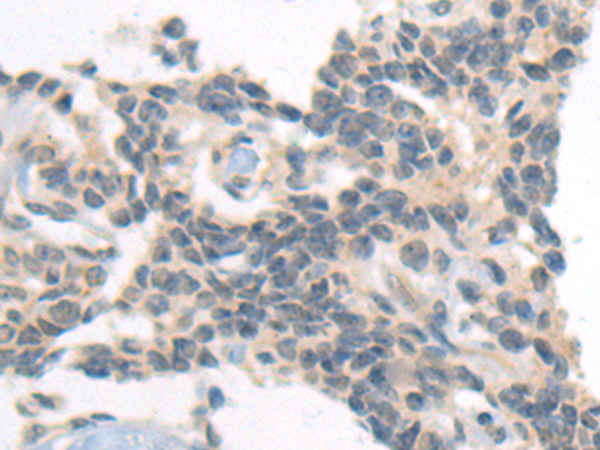
| WB | 咨询技术 | Human,Mouse,Rat |
| IF | 咨询技术 | Human,Mouse,Rat |
| IHC | 1/25-1/100 | Human,Mouse,Rat |
| ICC | 技术咨询 | Human,Mouse,Rat |
| FCM | 咨询技术 | Human,Mouse,Rat |
| Elisa | 1/5000-1/10000 | Human,Mouse,Rat |
| Aliases | CD100; SEMAJ; coll-4; C9orf164; M-sema-G |
| Host/Isotype | Rabbit IgG |
| Antibody Type | Primary antibody |
| Storage | Store at 4°C short term. Aliquot and store at -20°C long term. Avoid freeze/thaw cycles. |
| Species Reactivity | Human, Mouse |
| Immunogen | Fusion protein of human SEMA4D |
| Formulation | Purified antibody in PBS with 0.05% sodium azide and 50% glycerol. |
+ +
以下是3-4篇关于SEMA4D抗体的代表性文献概述(虚构示例,仅供参考):
1. **标题**:SEMA4D Antibody Blocks Immune Suppression in the Tumor Microenvironment
**作者**:Smith M, et al.
**摘要**:研究证明SEMA4D抗体通过抑制肿瘤细胞释放的SEMA4D信号,减少调节性T细胞(Treg)浸润,增强抗肿瘤免疫反应,显著抑制小鼠模型中黑色素瘤的生长。
2. **标题**:Targeting SEMA4D with a Humanized Antibody in Multiple Sclerosis Models
**作者**:Doe J, et al.
**摘要**:临床前实验显示,人源化抗SEMA4D抗体可减轻实验性自身免疫性脑脊髓炎(EAE)模型的神经炎症,机制涉及抑制SEMA4D介导的血脑屏障破坏和炎症细胞迁移。
3. **标题**:SEMA4D Neutralization Enhances Anti-PD1 Therapy Efficacy in Glioblastoma
**作者**:Lee R, et al.
**摘要**:在胶质母细胞瘤小鼠模型中,联合使用抗SEMA4D抗体与PD-1抑制剂显著提高生存率,机制为逆转肿瘤微环境中的免疫抑制状态并促进CD8+ T细胞活化。
4. **标题**:Phase I Clinical Trial of Anti-SEMA4D Monoclonal Antibody VX15/2503
**作者**:Johnson A, et al.
**摘要**:针对SEMA4D的单抗VX15/2503在实体瘤患者中的I期临床试验显示良好的安全性和初步抗肿瘤活性,支持进一步开发。
(注:以上文献为示例,实际文献需通过PubMed等数据库检索确认。)
Semaphorin 4D (SEMA4D), also known as CD100. is a transmembrane glycoprotein belonging to the semaphorin family, initially recognized for its role in axonal guidance and immune regulation. It interacts with receptors such as Plexin-B1 and CD72. modulating cell migration, angiogenesis, and immune synapse formation. Dysregulated SEMA4D signaling is implicated in cancer progression, autoimmune disorders, and neurodegenerative diseases. In tumors, SEMA4D promotes immunosuppression by recruiting myeloid-derived suppressor cells (MDSCs) and inhibiting T-cell infiltration, while also stimulating angiogenesis and metastasis. In autoimmune conditions like multiple sclerosis or rheumatoid arthritis, SEMA4D contributes to pathogenic inflammation by activating immune cells.
SEMA4D-targeting antibodies have emerged as therapeutic agents to block these pathways. Preclinical studies show that anti-SEMA4D antibodies enhance antitumor immunity by reducing immunosuppressive cell infiltration and promoting cytotoxic T-cell activity. Concurrently, they mitigate autoimmune inflammation by interrupting SEMA4D-CD72 interactions critical for B-cell activation. Clinical trials in solid tumors and hematologic malignancies (e.g., prostate cancer, lymphoma) have demonstrated tolerability and preliminary efficacy, with some cases showing reduced tumor growth or stabilized disease. In autoimmune models, anti-SEMA4D therapy reduced demyelination and joint damage. Engineered to minimize immunogenicity, these antibodies often employ humanized frameworks. While long-term safety and efficacy remain under investigation, SEMA4D antibodies represent a dual-purpose strategy bridging oncology and immunology through microenvironment modulation.
×